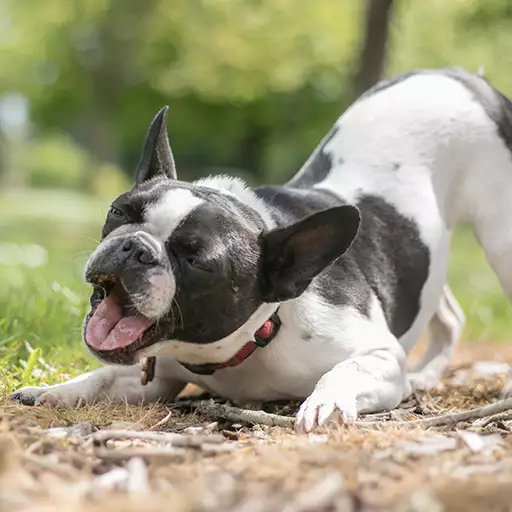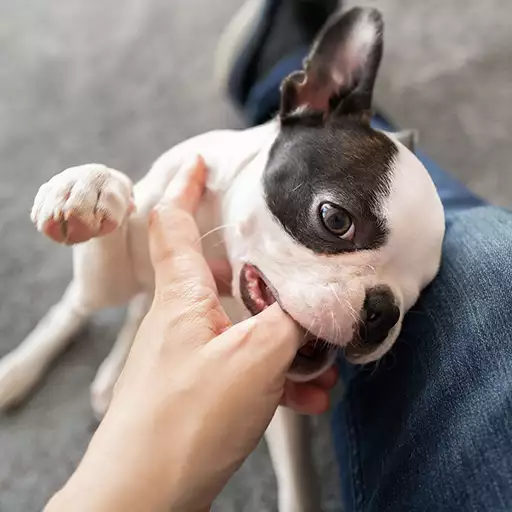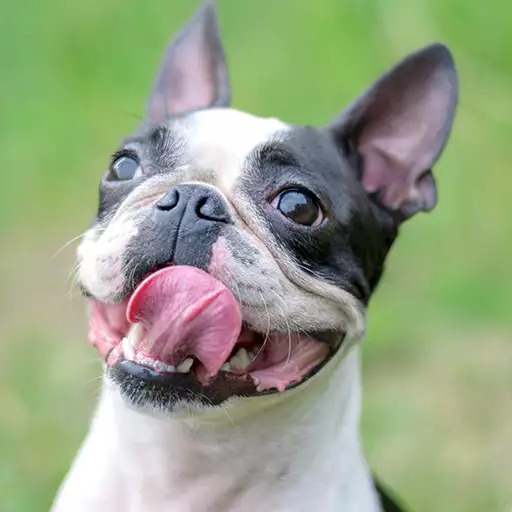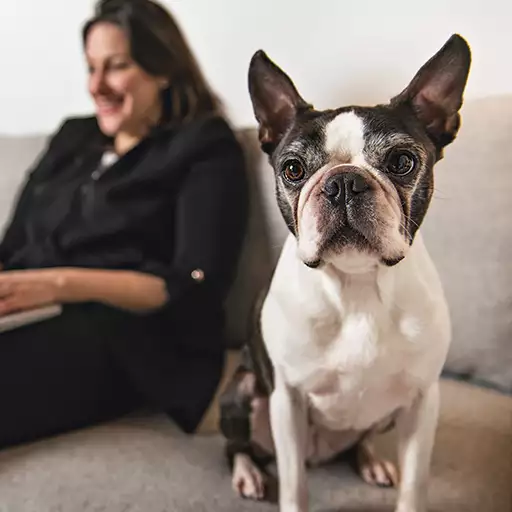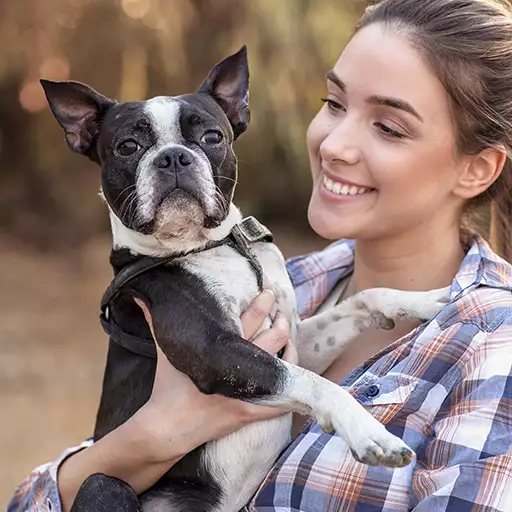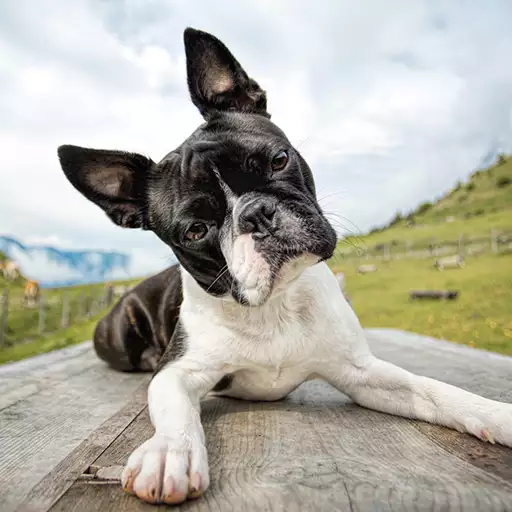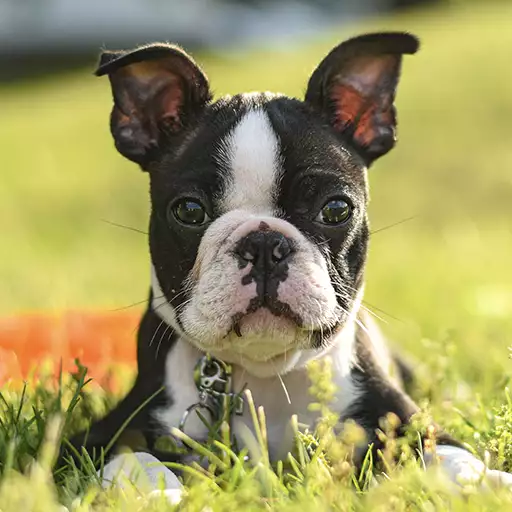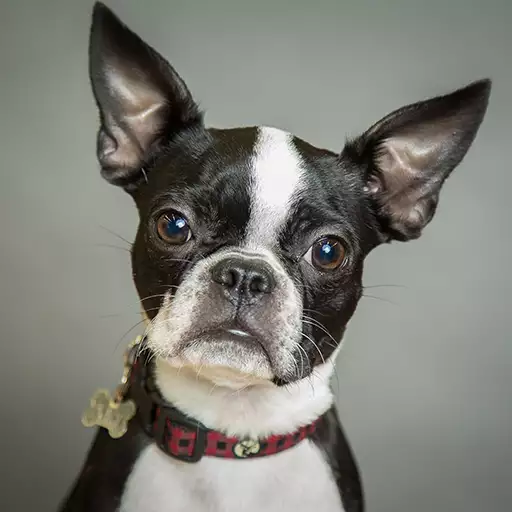The Boston Terrier
Often referred to as the “American Gentleman,” the Boston Terrier is a dapper little dog and one of the few breeds that was developed entirely in the United States. This breed originally hails from Boston, as the name suggests. Today’s Boston is lively, gentle, amusing, and very intelligent with markings that seem to suggest the breed is wearing a tuxedo.
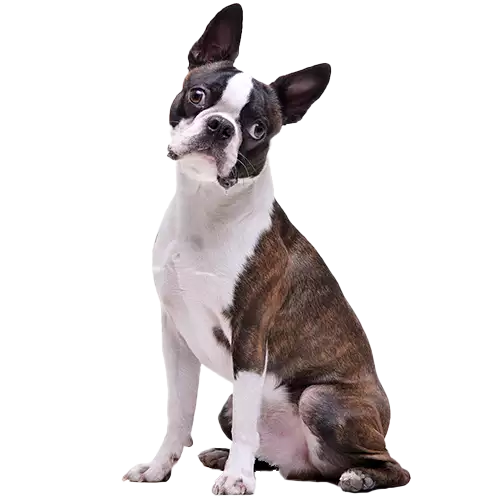
Boston Terrier Dog Breed Information

Life Span
11-13 Years

Height
15-17 Inches

Weight
12-25 Lbs

AKC Breed Group
Non-Sporting
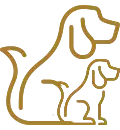
Size
Small Breed

Principal Trait
Short Nose
Boston Terriers are devoted to their owners and make excellent companions. They are especially well-suited to apartment living and love to snooze next to their people, keeping someone company.
Today the breed is the 23rd most popular breed in the United States.
History of the Boston Terrier
You might not know it from looking at today’s Boston Terrier, but these small dogs were originally developed for fighting. The breed originated in Boston around 1870. Almost all Boston Terriers today trace their family back to an imported Bulldog named “Hooper’s Judge,” named after his owner. Crossing the English Bulldog with a white English Terrier produced a terrier named Gyp.
Later, a dog named “Well’s Eph” was a descendant from these dogs and he was later bred to a dog named “Tobin’s Kate.” Hooper’s Judge weighed more than 27 ½ pounds and later Boston Terriers weigh as much as 44 pounds before breeders began aiming for a smaller dog. Dogs were interbred with French Bulldogs to help them become smaller.
The breed took the name “Boston Terrier” in 1891 and it was recognized by the American Kennel Club in 1893. In the 20th century most of the focus on the breed has been in breeding the dogs to be smaller, gentle companions instead of fighters.
Even before the Boston Terrier was developed there was a long history of crossing bulldogs and terriers to create bull-and-terriers dogs for blood sports. Such dogs had been used for bear baiting and bull baiting but these events had been outlawed in England in 1835. Other blood sports still existed such as dog fighting – which was still legal in the United States in the 19th century.
The Boston Terrier was developed to take part in these events but breeders quickly understood that the dogs were more popular with the public as companions than fighters.
Today the small, gentle Boston Terrier is never used for such events. They are not fighting dogs. Some early Boston Terriers weighed more than 40 pounds. Boston Terriers today weigh 25 pounds or less and are purely kept as pets. They are sweet house dogs.
Some people enjoy participating in fun events with their Boston Terriers such as obedience, agility, rally, flyball, even dock diving and weight pulling! Boston Terriers are very smart and easy to train. Where there’s a will, there’s a way with these dogs and their owners.
Boston Terrier Health-Related Issues
Boston Terriers are usually considered to be a healthy, long-lived breed but they can be subject to a variety of health problems.
Bostons are a brachycelphalic (short-nosed) breed which means they have a shortened muzzled. This affects their air passages, among other things.
Many Boston Terriers have problems with heat and humidity. It is recommended that you do not leave your Boston Terrier outside in the heat or in high humidity. Do not let one of these dogs over-exert himself in these conditions. Brachycephalic breeds can also need special attention when they are given anesthesia. Some airlines will not carry these dogs unless they are in-cabin.
Boston Terriers also have prominent eyes and they can have some eye problems. Juvenile and adult cataracts, cherry eye (the inner eyelid membrane becomes visible), corneal ulcers, and glaucoma can be problems in the breed.
Heart murmurs and mitral valve disease can affect some dogs; epilepsy and allergic dermatitis can also be found in some dogs. Deafness can also occur in the breed. The Boston Terrier Club of America provides more information about Boston Terrier health issues and research.
The breed has an average lifespan of 11 to 13 years but it’s not uncommon for many Bostons to live much longer.
Luxating patellas (similar to a slipped kneecap in a human) can occur in Boston Terriers, as it does in many small breeds. This condition varies in severity. You may notice your dog giving a bunny hop once in a while or it can become a regular problem and your dog may need surgery.
If your dog has a luxating patella, the patella momentarily slips out of position and your dog’s rear leg locks or goes lame. In a mild condition, the leg will quickly unlock and return to normal. In more advanced conditions, your dog may remain lame for longer periods of time. Arthritis can develop.
Because of their shorter air passages, Boston Terriers are particularly subject to snoring and something called “reverse sneezing.” Neither of these issues is really a health problem – but reverse sneezing can be a frightening noise when you hear it for the first time and you should know that it’s possible.
You may want to consider using a harness with your Boston Terrier instead of a collar. Some small breeds can have problems with their trachea if you pull on the collar and leash when walking the dog.
A body harness can give you control over the dog without pulling on the dog’s neck. Whether you use a collar or harness for your Boston Terrier can vary from dog to dog and how much they pull on the leash.
If you are thinking of breeding your Boston Terrier you should know that it is not unusual for Bostons to require a caesarian section during delivery. Their heads are rather large at birth compared to their small bodies which can present a problem for some mothers.
Boston Terrier Temperament
Boston Terriers are known for having a gentle temperament and they love to be with their families. They are lively but quiet dogs in the home. They usually get along well with other dogs and pets. They are also good with children and they make a good dog for an elderly person.
As with all dogs, it’s a good idea to socialize your Boston Terrier puppy while he’s young so he is familiar with different people and different things outdoors. You want to encourage him to be confident. This is true whether you live in the city or suburbs and whether your dog spends much time outdoors or spends most of his time in an apartment.
You and your puppy or dog can attend puppy preschool or puppy kindergarten classes or do things on your own for socialization. Check with your local kennel club or pet store for information about these classes. Kennel clubs and pet stores also offer obedience classes and can provide you with information about other dog activities. They are a good way to meet other dog people and get involved with events.
Bostons are generally friendly dogs so they don’t make good watchdogs or protectors. Boston Terriers don’t even bark very much. But these are some of the traits that make them very desirable if you live in an apartment.
According to owners, Boston Terriers are almost cat-like in their cleanliness and grooming habits. Bostons are reportedly stubborn at times but they do like to please their owners so, despite a stubborn streak, they are usually easy to train. The breed is known for having good manners.
Boston Terriers only require minimal exercise – another reason they make good apartment dogs. They enjoy walks and playing for short periods outside, but they are happy indoors. Their grooming needs are also very minor. They have a short, fine coat that sheds a little but they are not huge shedders. You won’t have to worry about constantly vacuuming with this breed. With regular brushing you should be able to manage any shedding.
Since their beginnings as a fighting dog, everything about the Boston Terrier has been focused on making the breed a good companion. This is a friendly, happy breed that is devoted to their family.
Boston Terriers are a brachycephalic breed (short-nosed) so heat and humidity can be a problem for them. If you live in a hot or humid climate, they do better in a home with air conditioning. Because they do have a short, fine coat, your Boston Terrier might appreciate a sweater when you go outside if you live in a very cold area in the winter.
Boston Terrier Grooming
Boston Terriers come in three sizes today: Under 15 pounds; 15 pounds and under 20 pounds; 20 pounds and not to exceed 25 pounds. Otherwise, dogs all look the same. Boston Terriers have a short head and a compact body. Their ears are small but stand erect and they have a short tail. Their muzzle is short and does not typically have any wrinkles.
The breed’s coat is short, smooth, bright, and has a fine texture. The breed has several colors: seal, brindle, or black with white markings. Boston Terriers usually have a striking and clean-cut appearance and most people can recognize the breed on sight. The breed’s white markings suggest that the dog is wearing formal wear, hence the nickname “American Gentleman.”
Bostons require minimal grooming. They are considered a “wash and go” breed. Brush regularly to reduce shedding. Bathe as needed. Bostons tend to groom themselves often and keep themselves clean. This is not a breed that gets very dirty. You should check your dog’s ears and clean them regularly. Brush his teeth and trim his nails regularly.
Boston Terriers have somewhat prominent eyes and they can get scratched or collect debris. You should check them often.
Boston Terrier Fun Facts
- Boston Terriers have naturally short tails. They are not docked.
- Boston Terriers do not come in solid colors. They always have white markings.
- Despite their small size Boston Terriers have excelled at agility, obedience, and rally. Some owners have successfully worked with their Boston Terriers in flyball, dock diving, tracking, lure coursing, barn hunting, and even weight pulling! Boston Terriers are really very versatile little dogs. They are smart, easy to train, and they love doing thing with their owners.
- Sergeant Stubby (July 21, 1916 – March 16, 1926) was a Boston Terrier who was the official mascot of the 102nd Infantry Regiment in World War I. He served for 18 months and took part in 17 battles. He has been called the most decorated war dog of World War I.
- Several colleges and universities have Boston Terriers as school mascots such as Boston University and Wofford College in Spartanburg, South Carolina.
- The Boston Terrier is the state dog of Massachusetts.
Common Boston Terrier Mixes
Boston Terriers are a popular breed with designer dog breeders. Here are some of the Boston Terrier mixes we found online:
- Basston
- Baussie
- Bo-Chi
- Bo-Dach
- Bo-Jack
- Boglen Terrier
- Bosapso
- BoShih
- Boskimo
- Bospin
- Bossi-Poo
- Bostchon
- Bostillon
- Bostinese
- Boston Bulldog
- Boston Cattle Dog
- Boston Iggy
- Boston Irish
- Boston Malterrier
- Boston Spaniel
- Boston Westie
- Brat
- Buggs
- Chinese Boston-Tzu
- Foxton
- Frenchbo Bulldog
- Frenchton
- Miniboz
- Piston
- Pomston
- Sharbo
- Shibos
Boston Terrier FAQs
What is a Boston Terrier’s Life Expectancy?
According to a 2004 breed health study conducted by the Kennel Club in the UK, the median age at death for Boston Terriers was 10 years and 11 months, with the oldest dog in the survey living to be 15 years and 9 months. Reports in the United States place the average age of death of Boston Terriers between 11 and 13 years, with some living to be older. The most common cause of death in the UK health survey was old age (28.6 percent), followed by cardiac (19 percent), and cancer (16.7 percent).
Are Boston Terriers easy to train?
Yes, Boston Terriers are considered to be easy to train. The breed is said to be stubborn at times but they are intelligent and they like to please their owners. With positive reinforcement, such as praise and rewards, Boston Terriers can learn obedience and other things you want to teach them. They are known for having good manners. You may even want to try activities like agility or rally with your Boston Terrier! People are really participating in lots of fun events with these dogs, despite their small size.
Do Boston Terriers shed a lot of hair?
No, Boston Terriers don’t shed a great deal. They have a short, fine coat that does shed, but they don’t shed a lot. With regular brushing you should not have a lot of hair around your home or on your furniture. Your Boston Terrier might appreciate a sweater or coat when you go outside in the winter if you live in a very cold climate since he doesn’t have a very thick coat.
Do Boston Terriers make good apartment pets?
Boston Terriers are one of the best apartment dogs. They are small and quiet. They don’t bark very much. They don’t require a lot of exercise. And they have very modest grooming needs. They also get along well with other pets and people. They enjoy being indoors with people and spending time with you. They are great apartment dogs.
Are Boston Terriers good with Children?
Yes, Boston Terriers are good with children. It’s a good idea to spend time socializing your Boston Terrier puppy with kids so he becomes accustomed to them, but most Boston Terriers can adapt to living with children of all ages. Teenagers, especially, might enjoy spending time with a gentle, quiet Boston Terrier. Younger children may need to have some supervision so they don’t play too roughly.
It’s always important to teach all children how to play gently with a dog so they don’t pull on tails and ears or do things to provoke a dog into biting. Thousands of children are bitten by dogs every year and most of those cases could be prevented with a little education. Take normal precautions.
More About Boston Terriers
No posts

